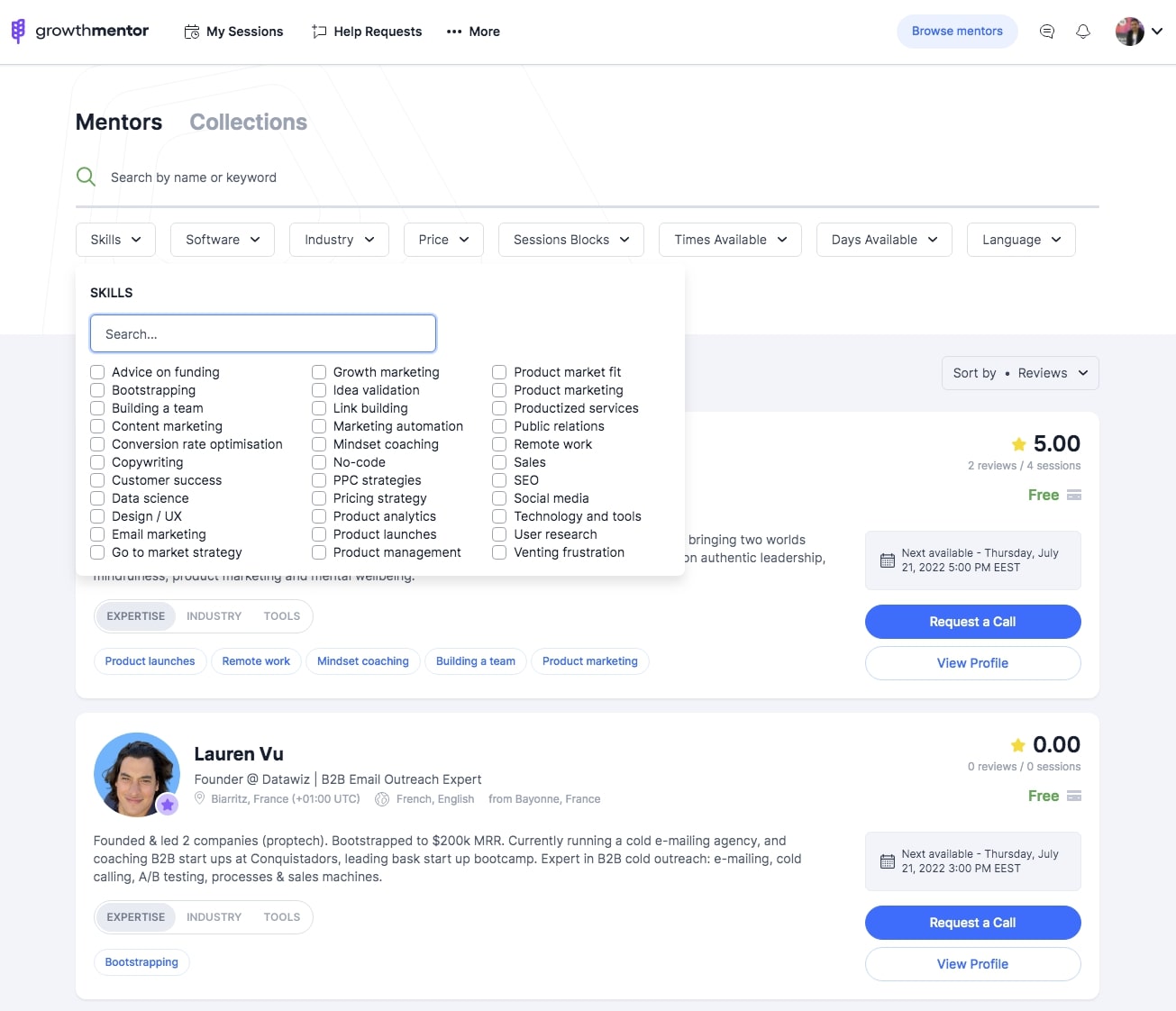How to Start a Mentorship Program for Your Startup
Even if your startup is just a few people strong, being proactive about inviting others into the fold will give you an early boost as you try to find product-market fit and scale. Here are some tips on starting a successful mentoring program in your startup.
A mentoring program can give you a competitive edge in the cutthroat world of tech startups by giving you a sounding board for ideas, and having a resource who has been in your shoes before. However, creating a successful program takes time and attention to detail.
When you’re just starting out, it can be tough to find mentors who have real expertise in your field and aren’t just giving advice that won’t reap much value. Luckily, there are ways to start building up your network of mentors while also giving back to the community by creating a mentoring program within your startup.
At GrowthMentor, we help connect people in various business functions and find mentors who can help them develop and grow their careers.
What is a Mentorship Program
A mentorship program creates an opportunity for your team members to learn from their colleagues or experienced folks outside your company. It’s a great way to foster a learning culture and create new opportunities for growth and productivity. Mentorship programs take time and effort to get off on the right foot, but once they’re in place, you can reap the rewards both personally and professionally in various ways.
Mentorship programs are an essential part of professional development. According to Forbes, 76% of people believe that mentors are important, but only 37% actually have one. This is because it’s more complicated than you may think to instill a successful program and find the right mentors.
Benefits of a Mentorship Program
A mentorship program can offer many benefits to your own personal development and your company’s progression. But don’t just take our word for it, 70% of Fortune 500 companies have a mentorship program due to the undeniable benefits that one offers.
Increased Job Satisfaction
According to this CNBC article, in a survey of 8,000 employees, 9 out of 10 employees who had a mentor reported being happy in their jobs. In contrast, those without mentors reported significantly lower satisfaction. Notably, higher job satisfaction is linked to higher performance and, thus, higher profits.
Increased Productivity
Another benefit of a mentorship program is increased employee productivity. Having a mentor who works in an adjacent department or has more experience can help alleviate fear and make everyone more comfortable asking for help when needed. Not only will it make employees feel better about seeking advice, but it will also create greater company camaraderie as you encourage interactions among all departments.
Leadership Development
Having good mentors is one of those things that makes everyone’s career easier. Most young people get their first mentor in college, where they usually pair up with an upperclassman (or peer mentor) to discuss projects and academic development—but as important as that relationship can be, it’s not much help once you leave school.
Many new grads struggle to find someone outside of work who can give them some insight into what leadership looks like or how to take a project from beginning to end.
Providing greener employees with more experienced mentors, especially if those mentors have leadership experience, your mentees are more likely to propel into a leadership position.
Inspires Innovation
Mentors can help align their mentees with the company vision and encourage creativity. Especially when the mentor works in a functional area different from the mentee, the diversity can inspire more out-of-the-box thinking and help both the mentor and mentee think about company problems differently.
Even if the mentor has a similar background to the mentee, by developing a trusting relationship, the mentee will likely feel more comfortable proposing ideas or thinking aloud. For this reason, mentorship programs can help foster innovation.
Understand Your Reasoning for Starting a Mentorship Program
So your team is growing, and you want to start a mentorship program within your company. This sounds great, but before you rush into action, make sure you understand why you want to create a mentorship program and its intended purpose for your startup. Is it for educating new employees? Upgrading current employee skills? Encouraging new innovation within your team?
Before starting your mentorship program, the most important question is, what do I want to get out of it? Do you want your employees to learn more about a particular skill? Are you looking for ways to build company culture and create stronger relationships between team members? Are you hoping that a mentorship program will help improve productivity or creativity in your organization? Whatever goals drive your decision, make sure they’re communicated clearly, so everyone knows how to make their mentorship experience as successful.
What Are Your Goals With the Mentorship Program?
Before you get started, be sure to create clear, measurable goals for the mentorship program. These goals should be realistic and tied closely to your company’s mission and goals. You should also be able to measure the goals with real-world metrics, such as how many people have signed up for the program (how many mentees are matched with mentors) or how much work has been accomplished through mentor coaching sessions.
While the goal of building stronger relationships within your company may seem like a good idea at first, it isn’t easy to measure. Try to think of a way you can gauge the success of this objective through quantitative means. Ask yourself these following questions:
- What byproduct will come from these stronger relationships?
- Is it an increase in sales?
- Is it more utilization during the day?
- Is it more reported employee satisfaction through surveys?
It’s fine to have some less measurable soft goals—such as creating better workplace culture—but make sure those softer goals aren’t hindering more concrete goals you need to meet.
Design Your Mentorship Program
When you’re planning your mentorship program, it’s essential to keep your goals for the program top of mind. This will help inform how the program will work, who will be involved, expectations, and more.
Once you have an idea of roughly what the program will look like, you will want to meet with the mentors so they know what to expect before having their first introduction with their mentee. Below will break down some considerations and questions to ask yourself while designing your mentorship program.
Who is Eligible?
When determining the logistics of the mentorship program, you first must decide who is eligible to participate. You will probably want to limit the number of mentors and mentees to make it more manageable, but also be sure you have enough mentors for all your mentees.
For instance, if you’re an online store wanting to introduce package subscriptions, then it might be worth outsourcing this mentorship by using a platform like Growth Mentor and hiring an expert who’s already done this in the past, especially if your company doesn’t have a specialist for this particular function.
The key is that everyone has an opportunity to benefit from the mentorship program.
How Do People Register?
If you want to kick off your mentorship program in your startup, how do people register? If you’re setting up a mentorship program for people within your organization, how do people sign up or apply?
Are there specific requirements or pre-requisites to be considered? Is it mandatory for certain employees? Have a plan of how the program will be communicated to the team and how participants will get involved or express interest.
How Much Commitment is Required?
Workplace mentoring is easy to institute, but it requires a significant commitment from each participant. A general rule of thumb is that each mentor and mentee should spend four hours together per month. Ideally, they will meet weekly for an hour at a time over six months.
However, the length of time and meeting frequency will again depend mainly on your goals for the program. It may also be fluid from case to case; some mentees may prefer more meetings where others may not, so you can also leave it up to the individuals to determine what makes the most sense for them.
But you should have a broad commitment range to communicate with your team before they get involved so they know what to expect.
How Long Will The Mentorship Last?
If you’re thinking about starting a mentorship program at your company, it can be helpful to know how long mentorships generally last.
Some companies have them last for a set number of months (usually 6–12), while others allow mentorships to last as long as both parties feel is necessary. If you want to formalize a mentorship program at your company, we suggest deciding how long each mentorship should last and writing that into your guidelines.
How Will You Measure Success?
It’s easy to think of success in general, but it’s essential to define it when setting up a mentoring program. For example, are you looking for more engaged employees? Is there a problem you hope to solve with your mentorship program? If you know what success looks like, it’ll be easier to measure how effective your mentorship program is.
Refer back to your goals for the program and evaluate those metrics to decide if you want to continue the program or make tweaks.
Create Program Guidelines
Decide how you want to run your mentoring program. Whether it’s just for your startup or if you plan to involve others in your industry, have a clear idea of what your program will look like and what its goals are.
Be sure to set aside plenty of time to research and write a formal set of guidelines (or rules) for mentors and mentees so that everyone knows exactly what their roles are within your program. It’s a good idea to have some flexibility with these rules so they can adapt as needed. The guidelines help establish clear objectives, goals, and expectations for this mentoring program to achieve.
Start Matching Mentors and Mentees
Many startups rely on word-of-mouth to fill out their mentorship programs. But if you want a more formal program, it’s easier to find match expert mentors effectively with an online matching platform.
At Growth Mentor, we match mentors with mentorees based on your unique goals and needs. You can view our available mentors on the platform if you want to see them here.
We are also happy to help advise on the best way to structure your program and start matching mentors with mentees. With our startup community growing worldwide, there is never an excuse not to find someone who would benefit from being part of your program.
Measure Impact
Many startups and larger companies employ mentors in some capacity, but a great way to set your mentoring program apart is to measure its impact.
For example, how many people have participated in your program? How much money have you saved, or how many lives have you changed through mentorship? If you can keep track of how your participants are doing, it’s easy to show that something positive has come from your work.
Collect Feedback & Set Benchmarks
Whether you’re starting a peer mentoring program or looking to add some structure to your existing mentorship structure, collecting feedback is always important.
Inviting individual employees and mentors/mentees into one-on-one sessions with HR or sending out surveys to participants are both excellent ways of ensuring you get constructive feedback. Even if you already have an established mentorship program, inviting employees and mentors/mentees to provide feedback helps ensure that everyone is happy with how things are going.
Finally, it’s worth establishing a benchmarking system to see what can be achieved over time. While this can be difficult when you’re just starting out, clear trends should emerge once you’re a few months into a program.
Start Your Mentorship Program Today
A mentorship program is a great way to help add some fuel to your startup fire. However, as with many things in life, you get out what you put in. Getting your mentees excited about being a part of your program and giving them real value will help spread the word and attract other peers into the program.
If you are looking to employ a mentorship program for your startup or are looking for a mentor for yourself, Growth Mentor has a solution for you. Our database has over 400 different mentors who can make recommendations to help perfect your growth strategy and help your startup excel. Get started today!




